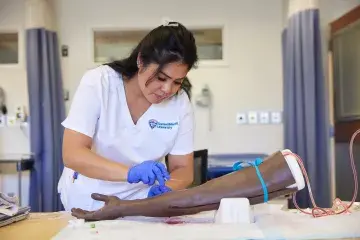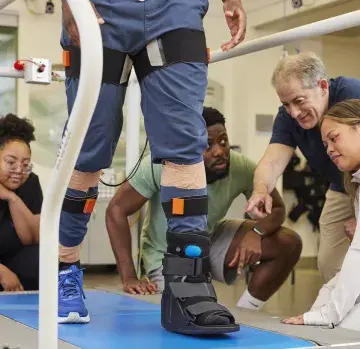Serving the Underserved: SMU’s Classroom in the Community
As patients stream into the waiting room at the Brighter Beginnings Family Health Clinic on a Friday morning, Samuel Merritt University (SMU) Assistant Professor Jane Perlas, DNP, APRN, NP-C, discusses the day’s caseload with a dozen of her Family Nurse Practitioner (FNP) students around a conference table in the back of the Richmond clinic.
The healthcare needs of the patients are varied and complex: A 76-year-old man with diabetes, hypertension, and a mysterious left shoulder pain; a sick baby whose siren cry can be heard from the waiting room and whose parents speak only Spanish; a middle-aged woman suffering from mind-altering levels of anxiety.
“If this is not the type of population you want to deal with, then you’re in for a long haul as a nurse practitioner, Perlas tells her students. “No one has a single diagnosis, and all of your cases will challenge you.” 
Before the students close their laptops and head into exam rooms, Perlas offers a word of advice.
“Own the diagnosis,” she says. “Do your work, make the call. Don’t worry, no one is going to let you get it wrong. We’re going to guide you, but you’ve got to own it first.”
Such are the real-life stakes in the clinic-as-a-classroom, where SMU students get the opportunity to work side-by-side with their teachers. Brighter Beginnings, staffed four days a week by a different SMU faculty member and a dozen students, is one of the only faculty-led clinics in the Bay Area and gives SMU students a unique learning experience to work with underserved clients in an under-resourced community.
“There’s how it is in academia and there’s how it is in the real world,” says Perlas. “Cases are not always going to present as they do in the textbooks.”
“It’s not just the complexity of healthcare needed, but the complexity of their patient’s lives,” Perlas adds. “For some of their patients, they’re making decisions such as, ‘Do I pay for my inhaler? Or do I buy food for my family? There are many social issues the students have to figure out; they can’t prescribe something their patients can’t afford to buy or can’t do.” 
For students, the clinical experiences offered at SMU are viewed as a critical distinction from other universities. Owing to the philosophy that learning is doing, and that students can make an immediate impact in communities, students from all five of SMU degree programs are placed in a clinical setting as soon as possible—often within their first school year.
For nurse practitioner students, clinical rotations are available from East Oakland to Sacramento, and give students the preparation and confidence they’ll need to work with populations who often fall through the cracks of the U.S. healthcare system.
At Brighter Beginnings, clients are low-income, sometimes uninsured and often undocumented.
Between patients, student Jasmin Moultrie says she’s studying to become an FNP because she wants to change the way patients get access to healthcare. FNPs deliver primary care, often practicing in areas where doctors and hospitals are out of reach.
“I want to help change health outcomes, especially the outcomes of the marginalized,” says Moultrie. “We all live in this community together, we all have to care for each other. Somebody has to care for them, and someone will have to care for me.”
The relationship between SMU and Brighter Beginnings began in 2013, when the clinic was a bare-bones operation, Perlas says. Chipped paint on the walls, no exam tables, and a lack of medical supplies.
“Like working out of a garage,” Perlas recalls.
To make conditions more challenging, an invisible barrier existed between the well-intentioned healthcare providers and residents in the community.
“We had to build trust with the residents,” Perlas says. “It was a trickling of patients at first. Undocumented residents needed to learn they wouldn’t get reported if they came to get care. Once the word-of-mouth spread that it was safe here, that trickling turned into a stream.”
Assistant Professor Noelene Moonsamy, MSN, FNP-C, supervises the cohorts of SMU students who work at Brighter Beginnings and observes the positive impact they have on their patients’ lives.
Moonsamy recalls a woman who was suffering from leukemia, but had few resources to afford treatment. The patient’s husband was homebound and could not care for her or take her to appointments. Perlas purchased a wheelchair for the patient, and another faculty member, Valerie Dzubur, EdD, FNP-C, and her students drove the client to treatment appointments. Once they connected the patient with Alameda Health Services, they pitched in to cover the patient’s co-pay costs.
“It’s satisfying that we’re able to make a difference in people’s lives,” Moonsamy says. “It goes with what our mission is as a university: To serve the underserved, to create a feeling of trust and equality with the communities we serve.”
Brighter Beginnings has come a long way in the past three years. The clinic now houses two in-take rooms and four examination rooms, all with examination tables and proper supplies. Between 40 and 50 SMU students rotate into the clinic each week. In the near future, Perlas says, she hopes to bring in students from other SMU degree programs—physical therapy, occupational therapy, podiatry—and make the clinic an interprofessional education experience.
“Working with other practitioners is the next step,” Perlas says. “That’s also how it’s going to be in the real world.”
Back at the clinic, student Paul Kiruuta is about to meet with a middle-aged woman complaining of serious ear pain. Before attending SMU, Kiruuta worked in his native Uganda with women who had HIV/AIDS.
“My happiest time is working with the poorest of the poor,” Kiruuta says. “Every day I can see my impact on their lives and the community I am working in. In hospitals, you see someone once, and then perhaps never again. In a primary clinic, or volunteer work, you are needed in a critical way and your impact is in front of you to see.”
Photos: Top, a family waits to see SMU student at Brighter Beginnings. Middle, student Paul Kiruuta meets with a patient. Below, Assistant Professor Jane Perlas and a group of FNP students.
To see more photos of the clinic and learn more about Samuel Merritt University, read the 2016 Report to the Community.


